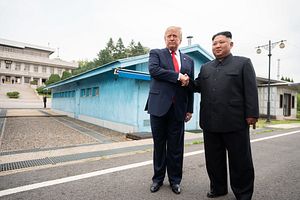What must Xi Jinping be thinking?
The much-flaunted meeting between U.S. President Donald Trump and Chinese President Xi Jinping took place on the sidelines of the G-20 summit in Osaka, Japan last week. News footage showed the two presidents sitting down face-to-face across a long table, not quite at stare-down level, but close.
Xi got a little relief from the meeting, but not much. Huawei, which Xi continues to fight on behalf of, can ostensibly resume purchases of chips and other technology-related goods and services from U.S. companies, although Washington. will continue to scrutinize the company for threats it may pose to American national security. Ren Zhengfei, Huawei’s founder, has said that Huawei could lose up to $30 billion in projected revenue over the next two years as a result of the ban which Trump put on sales of U.S. goods to the Chinese telecom behemoth in May of this year.
The president’s Huawei move also gives the United States continued insight into technological developments in Huawei that it would not have if the relationship were to be completely severed.
For its part, China made a huge purchase of soybeans, 544,000 mt, from the American market ahead of the meeting in Japan.
Soybeans may not quite match state-of-the-art chip technology in their importance to national security, but they have their place in the overall U.S.-China relationship.
First, for all the talk that Xi may be trying a wait-it-out strategy in hopes that a friendlier Democratic administration will come out of the 2020 election, the soybean purchase confounds that premise. Xi knows that Trump needs the farm vote. He probably also knows that farmers have said that they don’t want handouts to tide them over. They want honest-to-goodness sales, and with this purchase, that’s what they are getting. The soybean purchase is of genuine political help to Trump.
Could it be that, despite the pain of the trade war, Xi would rather see a quantity he is beginning to understand continue in the office of the president for another four years?
Importantly, the negotiating teams have been given the green light to ramp up talks again. And no new tariffs are being put in place at this time.
None of these moves are gifts. They just return things to a recent status quo, but certainly not to the state of things that existed before Trump took aim at China. Think of it as going back to a “restore point” on a PC.
Xi left Japan with a restoration of his new normal. Meanwhile, he must be wondering why most of the spoils of Trump’s political largesse were saved for Xi’s young, embattled neighbor.
For while Trump dialed down the pressure on China by one notch, leaving plenty of pain still in place, Trump left Kim Jong Un, chairman of North Korea, with historic new milestones: an invitation to the White House, “when the time is right,” and a visit to North Korean soil by a sitting U.S. president, clearly the photo-op of the year.
In all, in both transactions in Asia over the weekend, Trump has shown himself to have a wily understanding of a relationship tool found more in China and many other Asian nations than in the West.
China hands advise foreign negotiators to ensure that their Chinese counterpart “saves face” and does not “lose face” in the negotiation process. And while those concepts are relatively straightforward (although awkward in the execution for many Westerners), they do not take it a step further and emphasize the importance of “giving face.”
Trump is good at using this tool. The subtle difference is timing. Giving face is a prepaid account. And it’s done publicly, or it’s not worth doing.
In the case of China, Xi’s face was somewhat saved by the Huawei move. But Xi left Japan with no real advance in the relationship.
Trump saved that for Kim Jong Un. He gave Kim face. He offered to meet Kim at the DMZ separating the two Koreas, with no apparent advance promise that Kim would show up.
Essentially, Trump gave Kim a prepaid card and said, “I know you will spend this wisely, because if you don’t, I’m toast in the court of public opinion.”
Giving face like this is bold, but also very risky. It puts one’s own face on the line; it creates vulnerability where none had to exist.
Used wisely, it is a powerful tool, and a deal-maker. Trump, who in the past has shown that he is nearly impervious to the opinion of his detractors, nonetheless took a leap that could have been bruising had it gone wrong. In the lead-in to an election year, that gamble is all the more impressive.
Xi Jinping will have taken note. He got little, and understands that the United States, under Donald Trump at least, will continue to dig in its heels on the core issues that form the basis of the trade war. Meanwhile, his scrappy neighbor, who has given little except the cessation of nuclear tests and the reduction of missile tests, can consider buying a suitcase for yet another history-making event – a trip to the United States, and dinner at the White House.

































